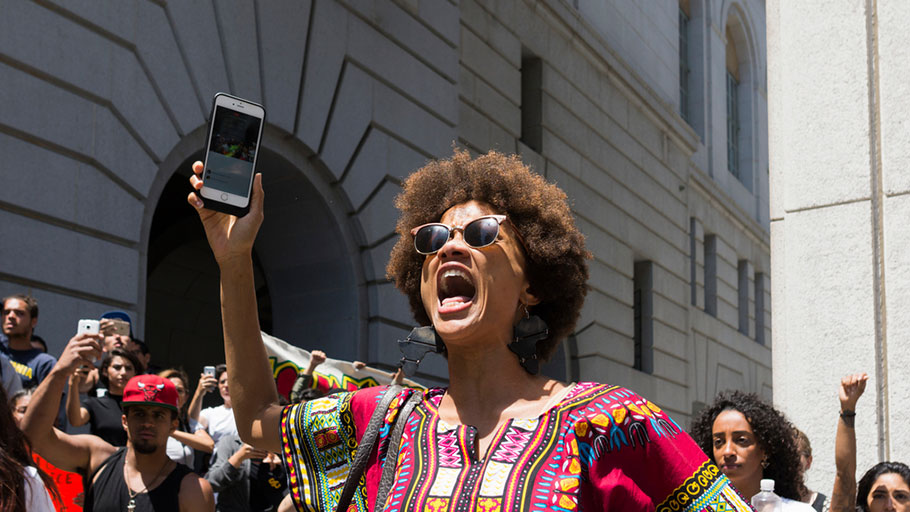Photo Credit — Shutterstock, Betto Rodrigues
Black women are getting the job done, but getting none of the credit.
It’s curious, though fairly predictable, that most postmortems of the Virginia and New Jersey gubernatorial races seem to gloss over the fact that Democrats lost the white vote. More specifically, Democrats lost white women, the same demographic of so-called values voters whose majority support for Donald Trump proved collectively that its most cherished value is white supremacy.
Fifty-one percent of white women and 63 percent of white men cast their ballots for Virginia’s Ed Gillespie, the most Trumpian local choice, whose main campaign strategy was immigration fear-mongering and praising slaveholding Confederates. In New Jersey, 50 percent of white men and 55 percent of white women voted for Kim Guadagno, the former lieutenant governor to Chris Christie who promised to ban sanctuary cities. People of color overwhelmingly rejected both candidates, but no group did so more decidedly than black women, who gave Ralph Northam and Phil Murphy more than 90 percent of their votes. Coverage of the election almost consistently credited “women,” without using any modifiers, for pushing Dems over the top, but that’s far too generous. Once again, black women got to the polls, got the job done, yet got almost no recognition or credit.
It was déjà vu all over again, as the saying goes. On election day 2016, 94 percent of black women voted for Hillary Clinton, not because they were monolithically #WithHer, but to keep the unqualified, lying, racist, self-described pussy grabber out of the White House. (#GirlIGuessImWithHer was an expression of black women’s justifiable discomfort with Clinton.)
In 2008, 2012 and again in 2016, African-American women had the highest voter participation rate of any demographic in the country, and black turnout soared on Tuesday. Black women’s crucial role in getting Northam and Murphy elected wasn’t some kind of fluke, it was par for the political course. While politically diverse, black women’s intersecting marginalized identities also mean they often prioritize racial and social justice, civil rights and protecting the social safety net. The result is that, collectively, black women vote for left-leaning and progressive candidates more consistently than any other demographic cohort, including other groups of color and black men.
According to the rules of voting, numbers and reliability, all this should make black women the undisputed and highly prized core of the Democratic base. The party would be smart to dedicate itself to energizing and engaging black women who didn’t vote in 2016, and focusing its attention on issues black women care about ahead of 2018 and 2020. But, nah. Instead, the fractious left, which finds so much else to quarrel about, has agreed to chase voters it will never win over. “We have got to take on Trump’s attacks…against Latinos and blacks…we’ve got to fight back every day on those issues,” Bernie Sanders stated perfunctorily during a recent interview, before moving on to the people whose feelings really matter. “But equally important, or more important: We have got to focus on bread-and-butter issues that mean so much to ordinary Americans.”
“Ordinary” is really a stand-in here for authentic, a way of specifying the people even the most “progressive” politicians in this country value as real citizens. (If you identify “Latinos and blacks” as distinct from “ordinary Americans,” you’re locating that normalcy somewhere within whiteness.) Dig in and you’ll also find a reminder that “ordinary Americans” don’t care about “those issues”—Trump’s attacks on marginalized communities—because they have “more important…bread-and-butter” problems to concern themselves with.
Black women are paid less than white men, white women and black men; more negatively affected by America’s health gap than any other group; punished with unfairly high rent and mortgage costs because of racism and sexism; and have lower life expectancy and higher infant mortality rates than white women. Those challenges rival any bread-and-butter issues faced by “ordinary” Americans, particularly those who don’t also have to reassert their humanity on the regular.
More to the electoral point, all this leftist fretting over a white vote that departed generations ago is just wasteful. Politico illuminated the futility of this thinking Wednesday, when its top story following Tuesday’s big Democratic wins turned out to be yet another “But What About The Trump Voters?” piece. The Trump supporters interviewed in the piece showed they’re still at least as racist as they were on election day 2016, not to mention absolutely willing to use the n-word in front of reporters. They’re still in the same cruddy situations Trump emptily promised to get them out of. They still report that they not only wouldn’t change their votes, but would vote for Trump again in a heartbeat. The only thing that’s changed with these “ordinary” Americans is their willingness to admit it was never about jobs or economic anxiety in the first place. “It’s not that the people who made Trump president have generously moved the goalposts for him,” Politico writer Michael Kruse notes. “It’s that they have eliminated the goalposts altogether.” In old-school diners and truck stops bursting with reporters all over this land, Trump supporters have made clear they will stand by their president as long as he keeps trying to keep Muslims out and continues to insult uppity black NFL players.
These are the people Democrats are spending their time stalking and cooing over, searching for the right combination of self-deprecation and swagger to catch their eye. It’s an unwise strategy, ignoring the Democrats’ real base, and the potential consequence is an erosion of support. A Black Women’s Roundtable/Essence poll released in September found that between 2016 and 2017, the percentage of black women who “felt the Democratic Party best represented their interest” fell from 85 to 74 percent. Additionally, “the percentage of black women who said neither party represents them jumped from 13 percent in 2016 to 21 percent in 2017,” according to a report by the New Republic. These black women won’t suddenly become Republicans—joining the political wing of the Klan does not appeal—but they are more likely to stay home. Dems need all the help they can get, yet seem hellbent on not helping themselves.
Black women, more than any other demographic, were right that Trump would be an unmitigated disaster. (In multiple pre-election polls, they expressed greater fear of a Trump presidency than any other group.) They’ve been leaders in every social justice movement from calling out sexual harassment, to destroying the Confederacy, to founding Black Lives Matter, to being the first woman to make a run for the White House.
I’m not saying individual black women’s politics can’t or shouldn’t be smartly and substantively critiqued, as Zoé Samudzi does. I am also definitely not with white liberals who have patronizingly suggested on social media that “black women will save us.” What I am saying is that black women consistently get this stuff right. At a time when this country is led by sentient versions of its worst tendencies, and Democrats are foolishly courting a voting bloc too busy looking backward to give a damn about the future, black women are doing this thing. This whole country—at the very least those who nurture any hope of moving forward again—better start following their lead.
Kali Holloway is a senior writer and the associate editor of media and culture at AlterNet.















